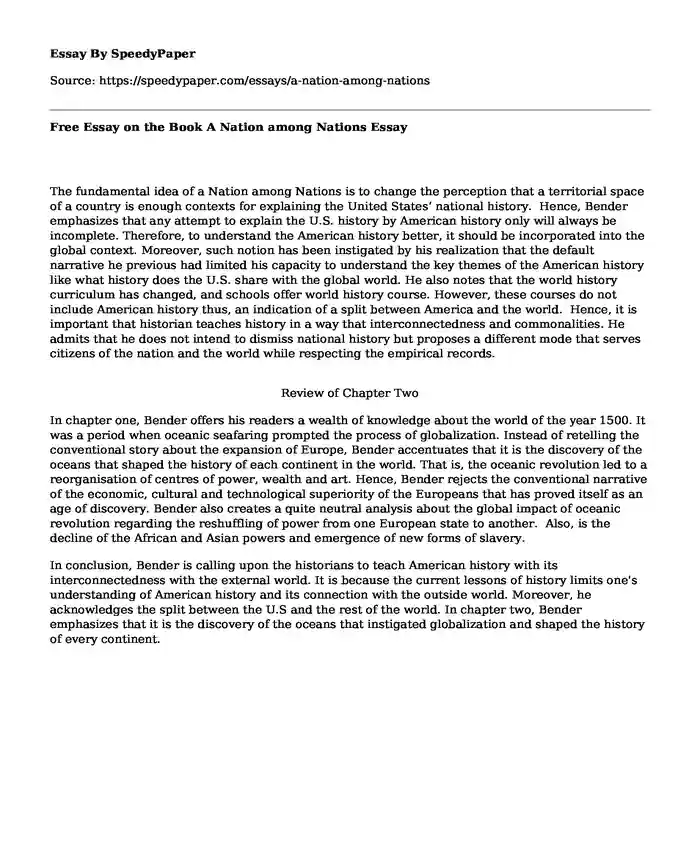
| Type of paper: | Essay |
| Categories: | History United States Literature |
| Pages: | 2 |
| Wordcount: | 414 words |
The fundamental idea of a Nation among Nations is to change the perception that a territorial space of a country is enough contexts for explaining the United States’ national history. Hence, Bender emphasizes that any attempt to explain the U.S. history by American history only will always be incomplete. Therefore, to understand the American history better, it should be incorporated into the global context. Moreover, such notion has been instigated by his realization that the default narrative he previous had limited his capacity to understand the key themes of the American history like what history does the U.S. share with the global world. He also notes that the world history curriculum has changed, and schools offer world history course. However, these courses do not include American history thus, an indication of a split between America and the world. Hence, it is important that historian teaches history in a way that interconnectedness and commonalities. He admits that he does not intend to dismiss national history but proposes a different mode that serves citizens of the nation and the world while respecting the empirical records.
Review of Chapter Two
In chapter one, Bender offers his readers a wealth of knowledge about the world of the year 1500. It was a period when oceanic seafaring prompted the process of globalization. Instead of retelling the conventional story about the expansion of Europe, Bender accentuates that it is the discovery of the oceans that shaped the history of each continent in the world. That is, the oceanic revolution led to a reorganisation of centres of power, wealth and art. Hence, Bender rejects the conventional narrative of the economic, cultural and technological superiority of the Europeans that has proved itself as an age of discovery. Bender also creates a quite neutral analysis about the global impact of oceanic revolution regarding the reshuffling of power from one European state to another. Also, is the decline of the African and Asian powers and emergence of new forms of slavery.
In conclusion, Bender is calling upon the historians to teach American history with its interconnectedness with the external world. It is because the current lessons of history limits one's understanding of American history and its connection with the outside world. Moreover, he acknowledges the split between the U.S and the rest of the world. In chapter two, Bender emphasizes that it is the discovery of the oceans that instigated globalization and shaped the history of every continent.
Cite this page
Free Essay on the Book A Nation among Nations. (2017, Oct 02). Retrieved from https://speedypaper.com/essays/a-nation-among-nations
Request Removal
If you are the original author of this essay and no longer wish to have it published on the SpeedyPaper website, please click below to request its removal:
- Save The Bay Movement - Free Essay on Environmental Protection
- Reflection Paper Example on the Dissertations
- Gender Roles Research Essay Sample
- Free Paper with Some Questions on Utilitarianism
- Essay Sample. How Upper-Class Roman Women Exercised Autonomy
- Essay Sample on Rousseau's Second Discourse
- Free Essay. Poetic Review of a Ukrainian Literature (Antonych Zibrani)
Popular categories




